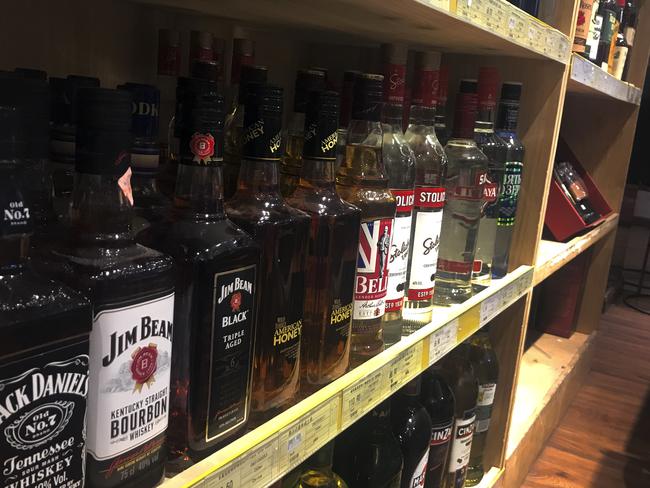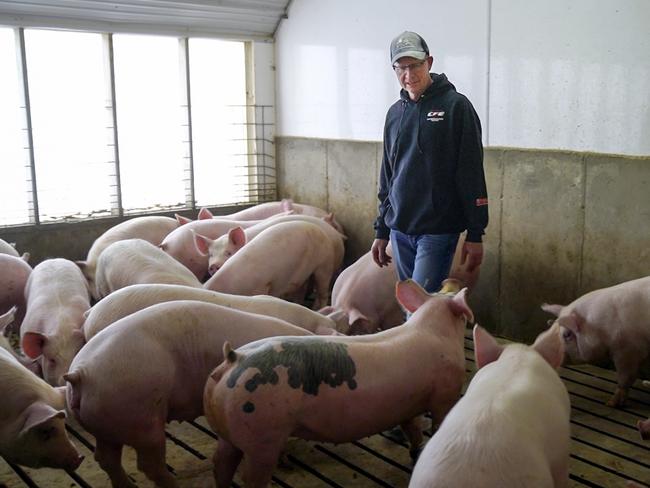US, China tariffs: 106 American products slammed with new levies
BEIJING has unveiled plans to hit Washington with painful taxes which could hit Donald Trump right where it hurts most.
THE United States and China are inching closer to an all-out trade war after Beijing unveiled plans for painful taxes which will hurt Donald Trump’s supporters right where it hurts.
Beijing announced it will target politically sensitive US exports in a move which initially sent global stocks lower.
The looming tariffs will affect more than 100 US products however it remains unclear when they will come into effect, worth about $A64 billion.
The 25 per cent levy on US imports will hit products ranging from soybeans to cars and even whisky, and comes just a day after Mr Trump announced a crackdown on Chinese imports.
The President has previously said his administration wants to target unfair trade practices that hurt the US economy.
Wall Street opened sharply lower but closed with solid gains after investors decided their fears might be overblown.
Mr Trump’s newly installed economic adviser Larry Kudlow said the stock market anxiety was understandable but “at the end of the rainbow, there’s a pot of gold”.
Mr Kudlow is well-known to financial markets after many years as an analyst on CNBC.
The President meanwhile unleashed a tweet storm, emphatically stating the US was “not in a trade war with China” and implying he was simply fixing the mistakes of previous administrations.

Commerce Secretary Wilbur Ross dismissed fears the trade confrontation could endanger the world’s largest economies.
In an interview with CNBC, Mr Ross downplayed Beijing’s retaliation, saying the $64 billion in US exports targeted for sanctions only amounted to about 0.3 per cent of US GDP.
“So it’s hardly a life-threatening activity,” he said.
However some US markets have already responded to the trade spat with higher prices and tighter supplies even though the largest of the retaliatory duties have yet to take effect.
Steel and aluminium suppliers began raising prices within 24 hours of Mr Trump’s announcement last month of his intention to hit the metals with steep import tariffs, according to the Institute for Supply Management.
Industry groups renewed calls for the White House to change tack.
The powerful US Chamber of Commerce, a stalwart supporter of Republican politicians, said tariffs were “not the way” to achieve fairer trade with China.
And aviation giant Boeing, which could see some of its smaller planes impacted by China’s tariffs as well as facing higher metals costs, said both sides could “do harm to the global aerospace industry”.
The company said it “will continue to engage both governments” as the sides note that “productive talks are ongoing”.

WILL TRUMP BLINK?
China is the largest market for US soy and the threat of tariffs on exports of the commodity has the potential to whip up trade anxieties in staunch Republican areas.
The American Soybean Association called on the Trump administration “to reconsider the tariffs that led to this retaliation”.
Scott Miller, a trade policy expert at the Centre for Strategic and International Studies, told AFP the tariffs proposed so far were unlikely to dent overall economic growth.
But that “does not mean there isn’t going to be a political backlash,” he said.
“I think China is perfectly happy to play a game of chicken with the United States on this because they believe the US will blink first.”
A US trade official said China’s retaliation is “simply an effort to intimidate us or to get us to back down so that they can continue doing all the bad things” including taking intellectual property from American companies.
Other than steel and aluminium, the tariffs are only a threat at this point: the US will have a 30-day comment period before determining the final list of Chinese goods on the hit list, and China is also holding off pending talks.
Should the tariffs go into effect, however, they would make for one of the largest trade wars ever involving the US, said Gary Clyde Hufbauer, a trade expert at the Peterson Institute for International Economics.
The amount, $64 billion, “in each direction is far larger than previous trade spats that we’ve had,” he told AFP.
But Mr Hufbauer said as November’s midterm elections approach, the political ramifications of the current trade policy could be greater than the economic ones for Mr Trump.
“He’s hurting his base. He’s really annoyed a lot of Republicans in the Senate and the House,” said Mr Hufbauer.
“The way he’s going now, he’s got to compromise out to have a chance of keeping the Congress Republican in November.”
— AFP with news.com.au



